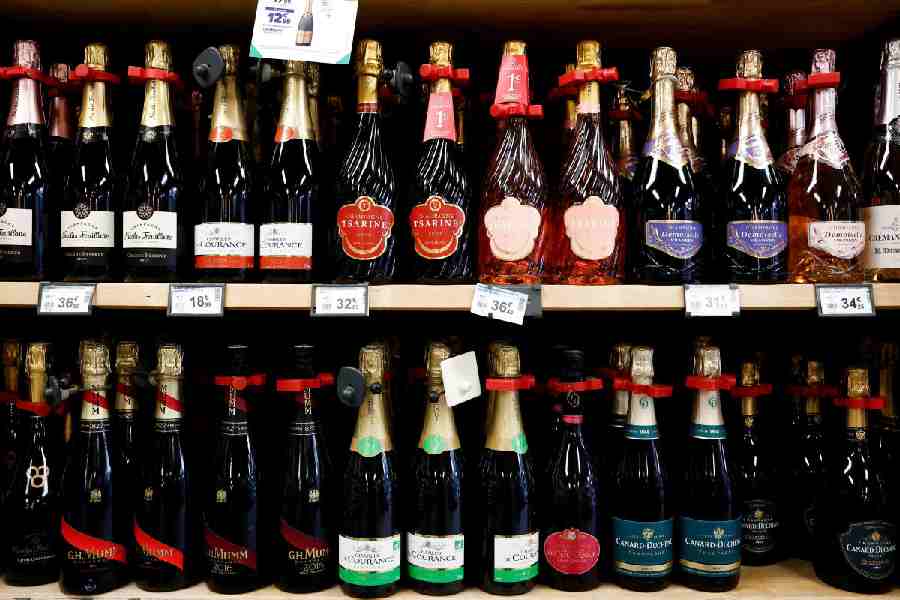 |
| File picture of a queue outside a liquor outlet in Thiruvananthapuram |
Thiruvananthapuram, Aug. 21: Kerala, which hard sells itself as God’s own country but has more takers for spirits than spirituality, has decided to close down all bars except those in five-star facilities and observe Sundays as dry days.
The stunning announcement — for the uninitiated to gauge the impact, just imagine that most sweets shops in Bengal are ordered shut — was made by the Congress-led UDF government after a political battle whose scales were titled by the Church and the Muslim League.
Chief minister Oommen Chandy, a Congress veteran, has termed the steps the first towards total prohibition — an arduous goal in a state that tops the national liquor consumption index at 8 litres per person a year.
All the alcohol in the state is sold by the government and it pocketed Rs 8,818 crore (22 per cent of the total revenue) in 2012-13 from liquor sales alone.
The state’s vibrant tourism industry — which earned Rs 5,560.77 crore foreign exchange alone in 2013 — was trying to fathom the fallout as many resorts do not have five-star facilities.
But in a state where countless families have been ruined by alcohol and the actual average age of consumption has come down from 19 in the 1980s to 14 now (the legal age for drinking in the state is 21 on paper), many will find it difficult to publicly oppose the announcements.
The dilemma was evident from the reaction of the CPM, the principal Opposition party. Veteran CPM leader V.S. Achuthanandan, widely respected by women for standing up for their protection, called the announcements a “political stunt” but desisted from opposing them.
Women have been the worst sufferers. Few will dispute that alcohol has been a curse in the state that is widely acclaimed for its achievements in education and public health care. Liquor has seeped into almost every aspect of social life in the state — an inseparable companion in hour of triumph as well as tragedy — so much so that there are “star artistes” who specialise in mimicking drunks on television.
Ironically, the seeds of the ban were sown by a court order that disallowed 418 bars from operating because they did not have adequate facilities.
The perception then was that the bars might be allowed to reopen after they offer better facilities. But the order triggered a debate — bringing out fissures within the ruling coalition — and culminated in today’s announcements.
According to a proposal that will be placed before the state cabinet, besides the 418 bars already closed, 312 others across the state will be shut down.
That means 730 bars will go out of business. That the small state with a population of a little over 3 crore has over 740 bars in itself reflects the depth of the problem. Bengal, whose population is three times more at 9.2 crore, has 1,200 bars, not even twice the number in Kerala.
Chandy said that if the ban ran into immediate legal problems, the existing abkari (liquor licence) policy will be revised and bar licences will be given only to five star hotels from April 1, 2015.
Bars and retail outlets in the state will no longer sell alcohol on Sundays. This is in addition to the dry day observed on the first day of every month. This will mean 52 days more to the dry calendar.
The state-run Kerala State Beverages Corporation (Bevco), which has monopoly over wholesale and retail sale of Indian Made Foreign Liquor (IMFL), will not open any more outlets and 10 per cent of the existing ones will down shutters every year, the chief minister said. Bevco has 334 outlets across the state and, according to government estimates, a total of 9.5 lakh men queue outside them every day for their bottle of “bliss”. The small state accounts for as much as 16 per cent of total liquor sales in the country, according to a study in 2011.
Chandy insisted that the government would, however, protect the traditional toddy industry, which employs a large number of tappers mostly belonging to the backward but politically powerful Hindu Ezhava community.
Considering the revenue-earning potency of liquor, a section of the government was in favour of a more “pragmatic approach” of tightening rules but allowing the bars to operate.
But Congress state president V.M. Sudheeran, an outspoken leader known for opinions that need not always reflect the government’s position, fiercely opposed the reopening of the bars. Many feel Sudheeran is keen to fill the space once occupied by A.K. “Saint” Antony before he moved to Delhi. As chief minister, Antony had banned arrack (country liquor) in 1996 in the state. The arrack prohibition still continues and becomes a matter of debate every time a hooch tragedy strikes.
This time, the Church which is deeply concerned by the increasing level of addiction, stepped in and demanded that the government proceed towards reducing the availability of liquor.
The Indian Union Muslim League, the most powerful ally of the Congress, also threw its weight behind the restrictions.











